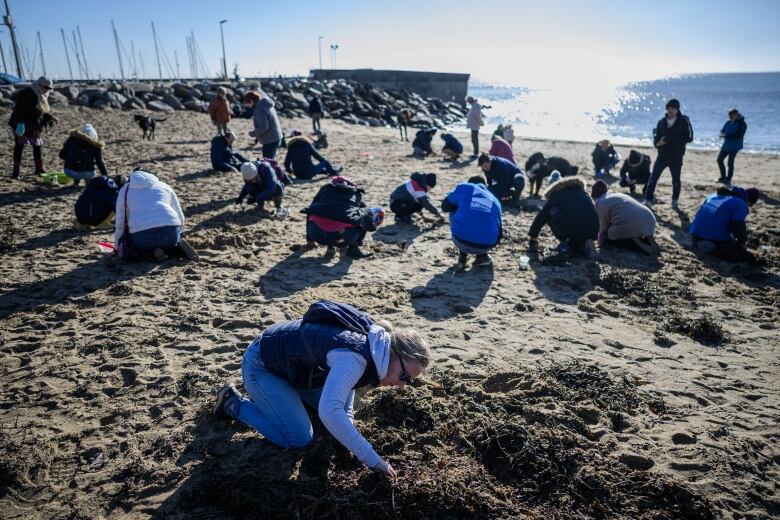When Lionel Cheylus rolled up his sleeves to help gather tiny plastic pellets strewn across a beach in France, he knew it was an impossible task — but that was kind of the point.
"This is a bit vain, to imagine that we can de-pollute [the beach] ... because this is very irreversible pollution," said Cheylus, a spokesperson for Surfrider Foundation Europe, an ocean health advocacy group.
"So the idea here is to collect and have some figures about the pollution, that helps us to legislate [change] after that," he told As It Happens host Nil Köksal.
Millions of these pellets, around 1.5 millimetres in diameter or about the size of a lentil, have been washing up on beaches in France and Spain since last year. Known as nurdles, or mermaid's tears, they're raw materials used to make all sorts of plastic goods.
Earlier this month, the mayors of French seaside towns Pornic and Les Sables d'Olonne, as well as the president of the Pays de la Loire region, filed a legal complaint over the plastic pollution covering the beaches.

Christophe Béchu, France's minister of ecological transition, described the situation as an "environmental nightmare," according to AFP.
During a recent cleaning excursion to a beach in Brittany, France, Cheylus and about 90 volunteers spent two hours collecting more than 60,000 individual pellets. Volunteers used sieves, tumblers, rakes and sometimes even their hands to pick up the plastic pollutants.
Their light weight can also make it hard for people to track them down.
"These pellets are really light, so it means they go back into the sea quite easily," Cheylus explained.
"So one day you will see a very big, white wave [of pellets.] But the day after ... the pellets go into the sea. And after that, you can find them on other beaches."
Whatever they can collect is just "a drop in the ocean," Surfrider's Jean-François Grandsart told the Guardian. He said the pellets break down into smaller microplastic-like particles, and are likely ingested by fish and other marine life. Some will, eventually, end up in humans' food.
Difficult to investigate
Most of the pellets found in Pornic appeared to be the same size, colour and shape, which suggests they may have come from the same container — making it likely they came from a single cargo spill. But Cheylus said he can't be sure.
As the pellets are unmarked, there's almost no way to know where they came from or who owns them. Cheylus said the loss of a single container barely makes a dent in a company's bottom line, so it's unlikely anyone would declare the goods lost.
"So it's very, very difficult to do those investigations," he said.
One of the largest pellet spills happened in 2021, when the X-Press Pearl cargo ship caught fire and sank off the coast of Sri Lanka.
More than 1,680 tonnes of pellets, many of them burned and contaminated with chemicals, covered hundreds of miles of coastline. A UN report called it the "single largest plastic spill" in history.
A near-impossible task
Working with Surfrider for several years has made Cheylus keenly aware of the level of human-made pollution in the world, particularly plastics and microplastics.
"It always drives me mad. Even when I'm going to the swimming pool, and when I'm swimming in the water, I say to myself: 'All this water that's here, it's probably full of microplastic too,'" he noted.
Despite the daunting challenges — and in the case of the mermaid's tears, near impossible task of cleaning them up — he still hopes his advocacy work will put a greater spotlight on plastic pollution in our oceans, pressuring governments and corporations for accountability.

On a citizen level, he also hopes people move away from single-use plastics in their daily lives, instead using reusable containers, paper products and glass bottles and containers whenever it's feasible.
"When we decide to consume differently without plastic, it really makes a difference. So I think we've got something — we citizens, in our hands. And we have to get inspired with all these new solutions without plastic, and try to do our part. I really believe that it can make the difference."

















